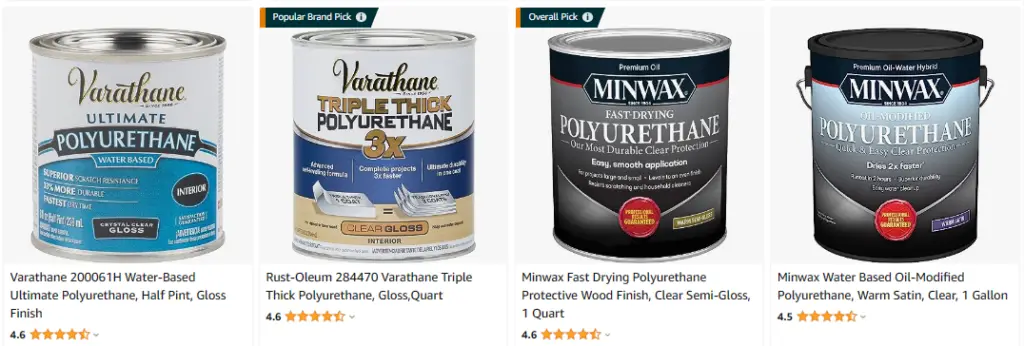
Polyurethane is a popular finish for guitars. It is strong, durable, and can protect the instrument from scratches and other damage.
In this blog post, we will discuss whether or not polyurethane can suit a guitar, and what the benefits and drawbacks of using this finish are.

Click Here To Check The Pricing On Amazon
Can You Use Polyurethane On A Guitar?
Yes, you can use polyurethane on a guitar. However, there are a few things to keep in mind when doing so.
Polyurethane is a tough finish that will protect your guitar from scratches and nicks. It is also very easy to apply. The key is to make sure that you sand the guitar down before applying the polyurethane. When you don’t, the finish will not adhere properly and it will look bad.
Another thing to keep in mind is that polyurethane can yellow over time.
So as you’re looking for a finish that will stay clear, polyurethane is not the best option.
What Is Polyurethane And What Are Its Benefits
Polyurethane is a polymer with repeating units of urethane. It is a versatile material with many different applications. These include insulation, sealants, adhesives, elastomers, and coatings.
Polyurethane has many benefits over other materials that are its durability, flexibility, and resistance to chemicals and weathering. It is also a very adaptable material that can suit many diverse applications.
Polyurethane is a great choice for many different projects because of its many benefits. When you are looking for a durable, flexible, and resistant material, then polyurethane is the right choice for you.
What Are The Drawbacks Of Using Polyurethane On A Guitar?
Polyurethane is difficult to work with, and it doesn’t always adhere well to certain types of wood. When you’re not careful, it’s easy to end up with a sticky mess that’s hard to clean up.
It can also get tricky to get a smooth and even finish with polyurethane. When you’re not experienced with using it, you might end up with a finish that’s full of bubbles or streaks.
Finally, polyurethane is one of the more expensive finishes you can use on a guitar. As you’re on a budget, there are other cost-effective options out there.
How To Apply Polyurethane To A Guitar
Polyurethane is one of the most durable finishes for a guitar, and it’s also one of the easiest to apply.
Here’s how to do it:
First, sand the guitar body with fine-grit sandpaper until smooth. Wipe away any dust with a damp cloth.
Next, apply a thin layer of polyurethane to the guitar body with a foam brush, working in long and even strokes.
Let the first coat dry for 4 hours before applying a second coat.
Once the final coat is dry, buff it lightly with a soft cloth.
Your guitar should now have a beautiful and glossy finish that will last for years to come!
Tips For Keeping Your Guitar In Good Condition With A Polyurethane Finish
One of the best ways to protect your guitar is to give it a polyurethane finish. This will help keep moisture and dirt from damaging the wood.
You should also regularly clean your guitar with a soft cloth to remove any build-up of grime.
When not in use, store your guitar in a case or gig bag to keep it safe from knocks and bumps.
Follow these tips that will help keep your guitar looking and sounding awesome for years to come!
How Do You Get Gloss Polyurethane Off A Guitar?
There are a few ways to remove polyurethane from a guitar.
One way is to use a product called Citristrip. This is a safe and effective way to remove polyurethane from guitars.
Another way is to use denatured alcohol.
Finally, you can use a product called Goof Off.
When you are careful, you can remove polyurethane from a guitar without damaging the finish.
Best Polyurethane For Guitars
There are a few different types of polyurethane that can suit guitars.
The most common type is nitrocellulose lacquer, which has been used for decades. It’s durable and has a glossy finish that can make a guitar shine!
Another type of polyurethane is urethane, which is on electric guitars. Urethane is more durable than nitrocellulose lacquer. But it doesn’t have the same high-gloss finish.
No matter what type of polyurethane you choose, make sure you apply it evenly and carefully. Too much polyurethane can make a guitar look cloudy.
That’s it! Choose the right polyurethane for your guitar.



